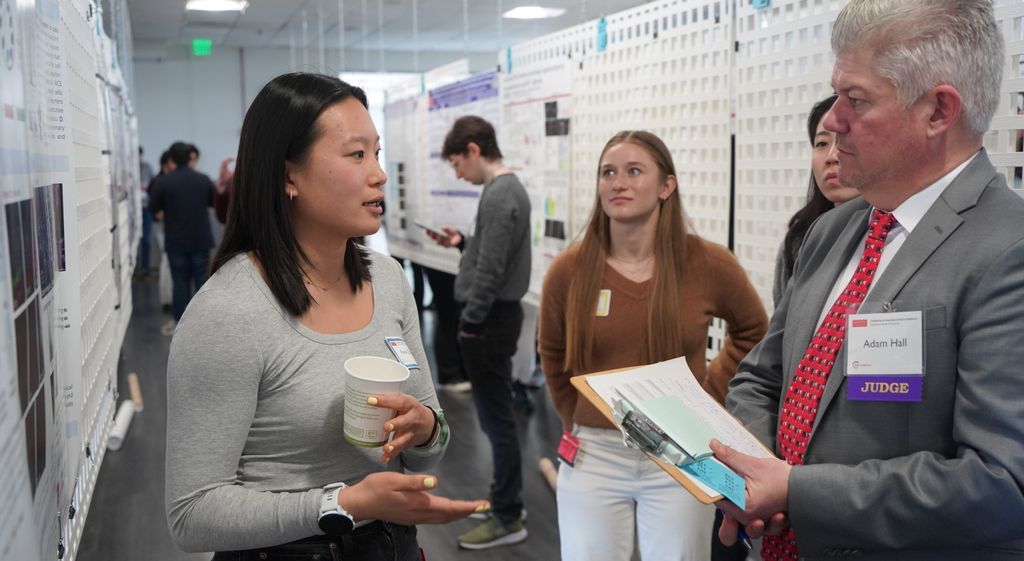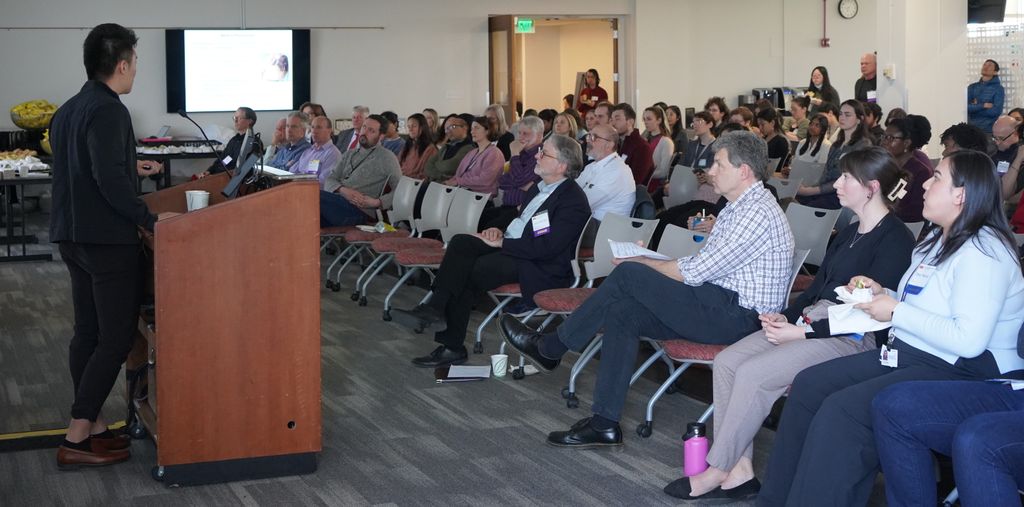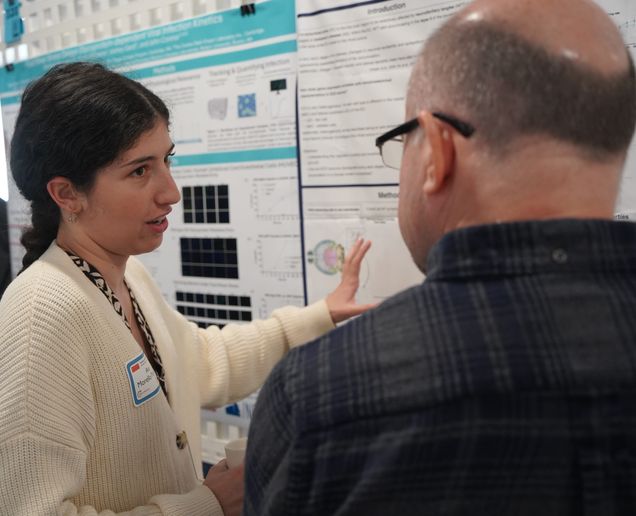Breadth and Depth of GMS Research on Display at Inaugural Research Symposium

The inaugural Graduate Medical Sciences (GMS) Research Symposium was held on April 10 in Hiebert Lounge with more than 150 students, faculty and staff attending. The symposium featured talks by postdoctoral fellows, PhD and MD/PhD students who were selected for Research Talk Awards, as well as nearly 80 poster presentations highlighting the wide range of work being done by postdoctoral researchers, MD/PhD, PhD and master’s students.
Participants said the symposium helped them experience the broad scope of GMS research and was an opportunity to sharpen the science communication skills that are essential tools in academia and in their careers.
“Doing presentations is a fundamental part of being a scientist, being a graduate student or a postdoc,” said Nicholas Skvir, PhD, MS’14. “It’s how you sell yourself and your research, how you get recognition, and that’s very necessary.”
Originally from Westwood, Massachusetts, Skvir is a postdoctoral researcher in aging and gerontology. He was presenting research he’d done with others in the Murphy Laboratory at the Center for Regenerative Medicine (CReM) investigating the role of megakaryocytes, cells typically found in the bone marrow and responsible for producing blood platelets, that are also found in lung tissue.
Skvir appreciated that lab director George Murphy, PhD, associate professor of medicine, provided opportunities to present research.
“He’s given me lots of chances to get out there, become more experienced at speaking, going to lots of conferences,” Skvir said.

Gillian Fennell, PhD, a first-year postdoctoral quantitative researcher working under a NIH National Research Service Award fellowship in rheumatology, stood ready beside her poster to explain her research on the prevalence and burden of chronic pain.
“I’m the first in my family to take this academic path,” said Fennell, who went to Cornell as an undergraduate and received her PhD from the University of Southern California. “I’m excited to come and work in my cubicle every day, figure out problems and come up with creative, more accurate interpretations of data.”
But as a postdoc, with relatively few people in her program, Fennell said you can feel siloed by the daily routine, and part of the appeal of the GMS symposium for her was admittedly social.
“It’s nice to get the opportunity to meet your same-age peers,” Fennell said.

Poster contest judge Adam Hall, PhD, assistant professor of anatomy & neurobiology, thought the symposium was useful and informative to both students and faculty.
“Most everyone, faculty and students, in their day-to-day work become very focused on what they’re doing and what they’re knowledgeable about, even though there’s a lot of research that’s occurring across campus,” Hall said. He said the GMS symposium format is an easy introduction to the presentation process that is integral throughout a researcher’s career, whether it’s at a scientific conference, applying for grants, or in defense of a graduate thesis.
“For some of the younger students, who may not have presented yet at a conference, this is an easier format; it’s a smaller venue, they don’t have to travel and yet it still gives them the same type of experience,” Hall said.
“I think it’s important for me to understand what my colleagues are doing, and this (symposium) helps broaden my horizon,” said Guanghao Yu, a second-year student in the MS in Medical Sciences (MAMS) program. MAMS is the largest GMS program, and most graduates continue on to medical school.
Yu was presenting research from the Majmundar Lab at Boston Children’s Hospital on a novel mechanism in a rare kidney disease.
“I think research is an integral part of being a well-rounded physician/scientist. My mentors have had their patients in clinic inform their research and vice versa. To be a great physician, it’s important to be part of the scientific discovery aspect, to better take care of our patients,” Yu said.
As a fifth-year MD/PhD student Rose Zhao is nearing the end of the research portion of her medical education. Her poster outlined her work with the Ganem Lab studying how specific types of errors in cell division give rise to specific tumor cells.
“These symposiums are great. They’re internal, so everyone is very supportive. No one’s here to challenge you…they’re just trying to understand what you’re doing,” said Zhao.
Gwen Beacham, PhD, is a postdoctoral research fellow working in the Hagedorn Lab. She was one of six presenters selected, from an applicant pool of 33 PhD and MD/PhD students and postdoctoral researchers, to receive the GMS Research Symposium Talk Award. She said she was drawn to BU by Elliott Hagedorn, PhD, assistant professor of medicine, and his work on understanding how blood and cancer cells migrate into and out of distinct tissues and organs.
Beacham said she appreciated the collaborative approach to research at BU.
“Everyone is supportive of each other and it’s really a special environment here,” said Beacham. Working near Boston Medical Center and collaborating with clinicians was also a draw.
Other GMS Research Talk Award winners included: third-year PhD students Isabel Orbe and Dilnar Mahmut; fifth-year MD/PhD student Linzheng Shi; fifth-year PhD candidate Chelsey Skeete; and postdoctoral researcher Jose Andres Alepuz Guillen, PhD.
Poster contest winners
Nine students winners were selected by judges out of the 79 posters.
Master’s Programs: Samuel Camilli and Kai Blumen.
Early Career PhD or MD/PhD programs: third-year PhD students Andre Krunic and Thomas Murphy.
PhD or MD/PhD programs: fourth-year PhD students Angela Capriglione and Ivy Hughes and Todd Dowrey, who was a fifth-year PhD student, but has since successfully defended his thesis and is a postdoctoral researcher.
Postdoctoral Fellows: Ioanna Yiannakou, PhD, MS, and Madeleine Nowak, PhD.